The gypsies they came to my Lord Cassilis’ yett
And O but they sang bonnie!
They sang sae sweet and sae complete
That down came our fair ladie.
She came tripping down the stairs
And all her maids before her;
As soon as they saw her weel-far’d face,
They coost their glamourie owre her.
She gave to them the good wheat bread
And they gave her the ginger;
But she gave them a far better thing,
The gold ring off her finger.
"Will ye go with me, my hinny and my heart?
Will ye go with me, my dearie?
And I will swear, by the staff of my spear,
That your lord shall nae mair come near thee."
"Gar take from me my silk manteel,
And bring to me a plaidie,
For I will travel the world owre
Along with the gypsie laddie.
"I could sail the seas with my Jockie Faa,
I could sail the seas with my dearie;
I could sail the seas with my Jockie Faa,
And with pleasure could drown with my dearie."
They wandred high, they wandred low,
They wandred late and early,
Until they came to an old tenant’s barn
And by this time she was weary.
"Last night I lay in a weel-made bed,
And my noble lord beside me,
And now I must ly in an old tenant’s barn
And the black crew glowring owre me."
"O hold your tongue, my hinny and my heart,
O hold your tongue, my dearie,
For I will swear, by the moon and the stars,
That thy lord shall nae mair come near thee."
They wandred high, they wandred low,
They wandred late and early,
Until they came to that wan water,
And by this time she was wearie.
"Aften have I rode that wan water,
And my lord Cassilis beside me,
And now I must set in my white feet and wade,
And carry the gypsie laddie."
By and by came home this noble lord,
And asking for his ladie,
The onie did cry, the other did reply,
"She is gone with the gypsie laddie."
"Go saddle to me the black", he says,
"The brown rides never so speedie,
And I will neither eat nor drink
Till I bring home my ladie."
He wandred high, he wandred low,
He wandred late and early,
Until he came to that wan water,
And there he spied his ladie.
"O wilt thou go home, my hinny and my heart,
O wilt thou go home, my dearie?
And I’ll close thee in a close room,
Where no man shall come near thee."
"I will not go home, my hinny and my heart,
I will not go home, my dearie;
If I have brewn good beer, I will drink of the same,
And my lord shall nae mair come near me.
"But I will swear, by the moon and the stars,
And the sun that shines so clearly,
That I am as free of the gypsie gang
As the hour my mother did bear me."
They were fifteen valiant men,
Black, but very bonny,
And they lost all their lives for one,
The Earl of Cassilis’ ladie.
And O but they sang bonnie!
They sang sae sweet and sae complete
That down came our fair ladie.
She came tripping down the stairs
And all her maids before her;
As soon as they saw her weel-far’d face,
They coost their glamourie owre her.
She gave to them the good wheat bread
And they gave her the ginger;
But she gave them a far better thing,
The gold ring off her finger.
"Will ye go with me, my hinny and my heart?
Will ye go with me, my dearie?
And I will swear, by the staff of my spear,
That your lord shall nae mair come near thee."
"Gar take from me my silk manteel,
And bring to me a plaidie,
For I will travel the world owre
Along with the gypsie laddie.
"I could sail the seas with my Jockie Faa,
I could sail the seas with my dearie;
I could sail the seas with my Jockie Faa,
And with pleasure could drown with my dearie."
They wandred high, they wandred low,
They wandred late and early,
Until they came to an old tenant’s barn
And by this time she was weary.
"Last night I lay in a weel-made bed,
And my noble lord beside me,
And now I must ly in an old tenant’s barn
And the black crew glowring owre me."
"O hold your tongue, my hinny and my heart,
O hold your tongue, my dearie,
For I will swear, by the moon and the stars,
That thy lord shall nae mair come near thee."
They wandred high, they wandred low,
They wandred late and early,
Until they came to that wan water,
And by this time she was wearie.
"Aften have I rode that wan water,
And my lord Cassilis beside me,
And now I must set in my white feet and wade,
And carry the gypsie laddie."
By and by came home this noble lord,
And asking for his ladie,
The onie did cry, the other did reply,
"She is gone with the gypsie laddie."
"Go saddle to me the black", he says,
"The brown rides never so speedie,
And I will neither eat nor drink
Till I bring home my ladie."
He wandred high, he wandred low,
He wandred late and early,
Until he came to that wan water,
And there he spied his ladie.
"O wilt thou go home, my hinny and my heart,
O wilt thou go home, my dearie?
And I’ll close thee in a close room,
Where no man shall come near thee."
"I will not go home, my hinny and my heart,
I will not go home, my dearie;
If I have brewn good beer, I will drink of the same,
And my lord shall nae mair come near me.
"But I will swear, by the moon and the stars,
And the sun that shines so clearly,
That I am as free of the gypsie gang
As the hour my mother did bear me."
They were fifteen valiant men,
Black, but very bonny,
And they lost all their lives for one,
The Earl of Cassilis’ ladie.
inviata da Riccardo Venturi - 24/9/2009 - 03:08
Lingua: Italiano
Versione italiana di Riccardo Venturi
[ca. 1992]
[ca. 1992]
JOHNNY FAA, o IL RAGAZZO ZINGARO
Vennero gli zingari al castello di Lord Cassilis
E come cantavano bene!
Cantavano in modo così armonioso
The la bella Lady scese a sentirli.
Scese giù per le scale
Preceduta da tutte le ancelle;
Non appena videro il suo bel viso
Le fecero un incantesimo.
Lei diede loro del buon pane bianco,
E loro le diedero la radice di zenzero;
Ma lei diede loro una cosa assai migliore,
L’anello d’oro che portava al dito.
"Verrai con me, mio dolcissimo amore?
Verrai con me, mia diletta?
Ti giuro sull’elsa della mia spada
Che tuo marito non verrà mai più da te."
"Toglietemi il mio manto di seta,
E portatemi una semplice coperta,
Ché io me ne andrò per il mondo
Assieme al ragazzo zingaro.
"Navigherei per il mare con il mio Johnny Faa,
Navigherei per il mare con il mio diletto;
Navigherei per il mare con il mio Johnny Faa,
E annegherei volentieri con il mio diletto."
Vagarono per ogni dove,
Vagarono in ogni momento,
Finché non giunsero ad una vecchia stalla
E a quel punto lei era stanca.
"Ieri notte dormivo in un letto ben fatto
Assieme al mio nobile marito,
E ora devo dormire in una vecchia stalla
Con le cornacchie che mi gracchian sopra"
"Stai zitta, mio dolcissimo amore,
Stai zitta, ti prego, mia diletta;
Ti giuro sulla luna e le stelle
Che tuo marito non verrà mai più da te."
Vagarono per ogni dove,
Vagarono in ogni momento,
Finché non giunsero a uno scuro fiume
E a quel punto lei era stanca.
"Ieri ho attraversato a cavallo questo fiume scuro
Con il mio Lord Cassilis accanto a me,
E ora devo entrarci dentro e guadarlo,
Portandomi appresso il ragazzo zingaro."
Il nobile Lord arrivò a casa
E chiese della sua Signora;
Qualcuno piangeva, qualcun altro rispose:
"Se n’é andata via con il ragazzo zingaro."
"Sellatemi quello nero", lui dice,
"Quello baio non galoppa così forte;
Non toccherò ne cibo né bevanda
Finché non riporterò a casa la mia sposa."
Vagò per ogni dove,
Vagò in ogni momento
Finché non giunse a quel limpido fiume
E là vide la sua sposa.
"Vuoi tornare a casa, mio dolcissimo amore,
Vuoi tornare a casa, mia diletta?
Ti chiuderò in una stanza serrata
Dove nessun uomo ti verrà mai vicino."
"Non tornerò a casa, mio dolcissimo amore,
Non tornerò a casa, mio diletto;
Se ho fatto buona birra, ne voglio bere anch’io,
Ed il mio Signore non verrà mai più vicino a me.
"Ma ti giuro sulla luna e le stelle
E sul sole che splende sì chiaro,
Che ora son libera dalla banda di zingari
Come quando mia madre mi partorì."
Eran quindici valenti uomini
Scuri di pelle, ma assai belli;
Tutti persero la loro vita per una sola donna,
La moglie del Conte di Cassilis.
Vennero gli zingari al castello di Lord Cassilis
E come cantavano bene!
Cantavano in modo così armonioso
The la bella Lady scese a sentirli.
Scese giù per le scale
Preceduta da tutte le ancelle;
Non appena videro il suo bel viso
Le fecero un incantesimo.
Lei diede loro del buon pane bianco,
E loro le diedero la radice di zenzero;
Ma lei diede loro una cosa assai migliore,
L’anello d’oro che portava al dito.
"Verrai con me, mio dolcissimo amore?
Verrai con me, mia diletta?
Ti giuro sull’elsa della mia spada
Che tuo marito non verrà mai più da te."
"Toglietemi il mio manto di seta,
E portatemi una semplice coperta,
Ché io me ne andrò per il mondo
Assieme al ragazzo zingaro.
"Navigherei per il mare con il mio Johnny Faa,
Navigherei per il mare con il mio diletto;
Navigherei per il mare con il mio Johnny Faa,
E annegherei volentieri con il mio diletto."
Vagarono per ogni dove,
Vagarono in ogni momento,
Finché non giunsero ad una vecchia stalla
E a quel punto lei era stanca.
"Ieri notte dormivo in un letto ben fatto
Assieme al mio nobile marito,
E ora devo dormire in una vecchia stalla
Con le cornacchie che mi gracchian sopra"
"Stai zitta, mio dolcissimo amore,
Stai zitta, ti prego, mia diletta;
Ti giuro sulla luna e le stelle
Che tuo marito non verrà mai più da te."
Vagarono per ogni dove,
Vagarono in ogni momento,
Finché non giunsero a uno scuro fiume
E a quel punto lei era stanca.
"Ieri ho attraversato a cavallo questo fiume scuro
Con il mio Lord Cassilis accanto a me,
E ora devo entrarci dentro e guadarlo,
Portandomi appresso il ragazzo zingaro."
Il nobile Lord arrivò a casa
E chiese della sua Signora;
Qualcuno piangeva, qualcun altro rispose:
"Se n’é andata via con il ragazzo zingaro."
"Sellatemi quello nero", lui dice,
"Quello baio non galoppa così forte;
Non toccherò ne cibo né bevanda
Finché non riporterò a casa la mia sposa."
Vagò per ogni dove,
Vagò in ogni momento
Finché non giunse a quel limpido fiume
E là vide la sua sposa.
"Vuoi tornare a casa, mio dolcissimo amore,
Vuoi tornare a casa, mia diletta?
Ti chiuderò in una stanza serrata
Dove nessun uomo ti verrà mai vicino."
"Non tornerò a casa, mio dolcissimo amore,
Non tornerò a casa, mio diletto;
Se ho fatto buona birra, ne voglio bere anch’io,
Ed il mio Signore non verrà mai più vicino a me.
"Ma ti giuro sulla luna e le stelle
E sul sole che splende sì chiaro,
Che ora son libera dalla banda di zingari
Come quando mia madre mi partorì."
Eran quindici valenti uomini
Scuri di pelle, ma assai belli;
Tutti persero la loro vita per una sola donna,
La moglie del Conte di Cassilis.
Lingua: Scozzese
La versione (più tarda) eseguita da Dick Gaughan.
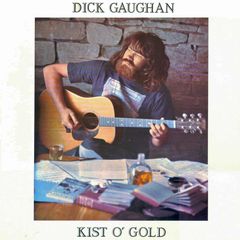
Presenta la vera grafia tradizionale scozzese, assai diversa da quella inglese, corrispondente alla pronuncia effettiva. Qui si tratta veramente di una lingua diversa dall'inglese. Proviene dall'album Kist O Gold ("Scrigno d'oro") del 1977. [RV]

Presenta la vera grafia tradizionale scozzese, assai diversa da quella inglese, corrispondente alla pronuncia effettiva. Qui si tratta veramente di una lingua diversa dall'inglese. Proviene dall'album Kist O Gold ("Scrigno d'oro") del 1977. [RV]
THE GYPSY LADDIES
Three gipsies cam tae our haa door
An wow bit thae sang bonnie-o
Thae sang sae sweet an sae complete
That thae chairmt the Earl o Fyvie's ladie-o
An it's she cam trippan doun the stair
Wi har maidens twa afore har-o
An thae tuik ane luik at her weil-faured face
An thae cast thair spells out ower her-o
Thae gied tae har the nutmeg fine
Likewise the wee bit ginger-o
An the ane o thaim stept tae har side
Stole the gowd ring aff har finger-o
An 'tis she's taen aff har silken goun
Pit oan har tartan plaidie
An she's caad har maidens tae har side
For tae bid fareweil tae thair ladie-o
Bit whan har guid lord cam hame that nicht
He wis spieran for his ladie
"Oh, the hound has rin an the hawks are flown
An the gipsies awa wi your ladie-o"
"Gae saddle tae me the bonnie black steed
The broun wis never sae speedie-o
An it's A wull neither eat nor drink
Untull A bring back my ladie-o"
An it's he's rade east an he's rade west
An he's rade thro Strathbogie-o
Untull he spied his ain bonnie lass
She wis followan the gipsy laddies-o
"Well, last time that A crossed this burn
A had dukes and lairds tae attend me-o
Bit this nicht A maun tak tae ma white feet an wade
Wi the gipsies wadan aa roun me-o"
"Thair's sieven brithers amang yese aa
An wow bit ye sang bonnie-o
Bit this verra nicht ye'll aa hing high
For stealan the Earl o Fyvie's ladie-o"
An he's sent for a hangman frae Fife
An anither frae Kirkcaldy-o
An he's lain thaim aa doun ane by ane
For stealan awa his bonnie ladie-o
"Last nicht A slept in a braw feather bed
Wi the sheets turnt doun sae bravely-o
Bit this nicht A maun lie in a cauld barren field
Wi the gipsies lyan aa roun me-o"
Three gipsies cam tae our haa door
An wow bit thae sang bonnie-o
Thae sang sae sweet an sae complete
That thae chairmt the Earl o Fyvie's ladie-o
An it's she cam trippan doun the stair
Wi har maidens twa afore har-o
An thae tuik ane luik at her weil-faured face
An thae cast thair spells out ower her-o
Thae gied tae har the nutmeg fine
Likewise the wee bit ginger-o
An the ane o thaim stept tae har side
Stole the gowd ring aff har finger-o
An 'tis she's taen aff har silken goun
Pit oan har tartan plaidie
An she's caad har maidens tae har side
For tae bid fareweil tae thair ladie-o
Bit whan har guid lord cam hame that nicht
He wis spieran for his ladie
"Oh, the hound has rin an the hawks are flown
An the gipsies awa wi your ladie-o"
"Gae saddle tae me the bonnie black steed
The broun wis never sae speedie-o
An it's A wull neither eat nor drink
Untull A bring back my ladie-o"
An it's he's rade east an he's rade west
An he's rade thro Strathbogie-o
Untull he spied his ain bonnie lass
She wis followan the gipsy laddies-o
"Well, last time that A crossed this burn
A had dukes and lairds tae attend me-o
Bit this nicht A maun tak tae ma white feet an wade
Wi the gipsies wadan aa roun me-o"
"Thair's sieven brithers amang yese aa
An wow bit ye sang bonnie-o
Bit this verra nicht ye'll aa hing high
For stealan the Earl o Fyvie's ladie-o"
An he's sent for a hangman frae Fife
An anither frae Kirkcaldy-o
An he's lain thaim aa doun ane by ane
For stealan awa his bonnie ladie-o
"Last nicht A slept in a braw feather bed
Wi the sheets turnt doun sae bravely-o
Bit this nicht A maun lie in a cauld barren field
Wi the gipsies lyan aa roun me-o"
inviata da Riccardo Venturi - 24/9/2009 - 03:51
Lingua: Italiano
Versione italiana di Riccardo Venturi
24 settembre 2009
24 settembre 2009
I RAGAZZI ZINGARI
Vennero tre zingari alla porta di casa.
E come cantavan bene, oh
Cantavano in modo così armonioso
Che incantaron la Contessa di Fyfe, oh
E lei scese giù per le scale
Preceduta da due ancelle, oh
Gettarono uno sguardo al suo bel viso
E le fecero un incantesimo, oh
Le diedero una buona noce moscata
E anche un pezzetto di zenzero, oh
E uno di loro le si avvicinò
E le rubò l'anello d'oro dal dito, oh
E lei si tolse la sua gonna di seta
E si mise il gonnellino di tartan, oh
E poi chiamò a sé le ancelle
Perché dicessero addio alla loro padrona, oh
Ma quando il suo buon signore tornò a casa la sera
Si mise a chiamare la sua signora:
“Oh, il cane è scappato, i falconi son volati via,
E gli zingari han portato via la vostra signora, oh”
“Sellatemi il bel destriero nero
Ché il baio non è stato mai così veloce, oh
E io non mangerò né berrò niente
Finché non riporterò indietro la mia signora, oh”
Cavalcò a oriente e a occidente,
E cavalcò fino allo Strathbow, oh
Finché non vide la sua bella donna
Che seguiva i ragazzi zingari, oh
“Beh, l'ultima volta che sono passato per questa landa
Avevo con me dei lords al mio servizio,
Ma stanotte devo guadare il fiume a piedi nudi
Con gli zingari che guadano assieme a me, oh”
“Ci son sette fratelli tra di loro,
E come cantan bene e armonioso, oh
Ma proprio stanotte li impiccherò tutti
Perché hanno rapito la Contessa di Fyfe, oh”
Ha mandato a chiamare un boia da Fyfe
E un altro ancora da Kirkcaldy, oh
E li ha messi alla forca uno ad uno
Perché han rapito la sua bella signora, oh
“Ieri notte dormivo in un bel letto di piume
Con le lenzuola ben rincalzate, oh
Ma stanotte devo dormire in un campo freddo e spoglio
Con gli zingari che mi giacciono attorno, oh.”
Vennero tre zingari alla porta di casa.
E come cantavan bene, oh
Cantavano in modo così armonioso
Che incantaron la Contessa di Fyfe, oh
E lei scese giù per le scale
Preceduta da due ancelle, oh
Gettarono uno sguardo al suo bel viso
E le fecero un incantesimo, oh
Le diedero una buona noce moscata
E anche un pezzetto di zenzero, oh
E uno di loro le si avvicinò
E le rubò l'anello d'oro dal dito, oh
E lei si tolse la sua gonna di seta
E si mise il gonnellino di tartan, oh
E poi chiamò a sé le ancelle
Perché dicessero addio alla loro padrona, oh
Ma quando il suo buon signore tornò a casa la sera
Si mise a chiamare la sua signora:
“Oh, il cane è scappato, i falconi son volati via,
E gli zingari han portato via la vostra signora, oh”
“Sellatemi il bel destriero nero
Ché il baio non è stato mai così veloce, oh
E io non mangerò né berrò niente
Finché non riporterò indietro la mia signora, oh”
Cavalcò a oriente e a occidente,
E cavalcò fino allo Strathbow, oh
Finché non vide la sua bella donna
Che seguiva i ragazzi zingari, oh
“Beh, l'ultima volta che sono passato per questa landa
Avevo con me dei lords al mio servizio,
Ma stanotte devo guadare il fiume a piedi nudi
Con gli zingari che guadano assieme a me, oh”
“Ci son sette fratelli tra di loro,
E come cantan bene e armonioso, oh
Ma proprio stanotte li impiccherò tutti
Perché hanno rapito la Contessa di Fyfe, oh”
Ha mandato a chiamare un boia da Fyfe
E un altro ancora da Kirkcaldy, oh
E li ha messi alla forca uno ad uno
Perché han rapito la sua bella signora, oh
“Ieri notte dormivo in un bel letto di piume
Con le lenzuola ben rincalzate, oh
Ma stanotte devo dormire in un campo freddo e spoglio
Con gli zingari che mi giacciono attorno, oh.”
Per Alessandro il Gutnico (e non solo)
Consiglio di ascoltare la versione di Dick Gaughan riportata nei video: oltre a essere splendida, fa sentire veramente cos'è lo Scozzese rispetto all'inglese. Il testo è leggermente differente (non molto). Lo scozzese veramente stretto, come in questo caso, risulta incomprensibile sia agli inglesi sia a chi conosce, anche bene, l'inglese standard: provate a seguire la canzone senza prima guardare il testo, e se ci capite cinque parole vi pago una cena :-) Caratteristica saliente è la "RRRRR" scozzese assolutamente esagerata, in totale opposizione con l'inglese dove usualmente è accennata appena o addirittura muta. Uno scozzese che si sforza di parlare l'inglese normale si riconosce dalle "R" e dall'incapacità di pronunciare le "L" finali (per "hall", dice "haa").
Consiglio di ascoltare la versione di Dick Gaughan riportata nei video: oltre a essere splendida, fa sentire veramente cos'è lo Scozzese rispetto all'inglese. Il testo è leggermente differente (non molto). Lo scozzese veramente stretto, come in questo caso, risulta incomprensibile sia agli inglesi sia a chi conosce, anche bene, l'inglese standard: provate a seguire la canzone senza prima guardare il testo, e se ci capite cinque parole vi pago una cena :-) Caratteristica saliente è la "RRRRR" scozzese assolutamente esagerata, in totale opposizione con l'inglese dove usualmente è accennata appena o addirittura muta. Uno scozzese che si sforza di parlare l'inglese normale si riconosce dalle "R" e dall'incapacità di pronunciare le "L" finali (per "hall", dice "haa").
Riccardo Venturi - 24/9/2009 - 03:35
Ne ho trovata una versione nell'album di Jean Ritchie "Ballads from Her Appalachian Family Tradition" che risale al 1961.
Jean Ritchie - The Gypsy Laddie (con l'intero album)
Jean Ritchie - The Gypsy Laddie (con l'intero album)
Alessandro - 26/9/2009 - 09:45
Lingua: Inglese
Tra le primissime incisioni dell’american version de “The Gypsy Laddie” c’è quella del 1939 di tal Cliff Carlisle, virtuoso dell’hawaian steel guitar ed esponente del genere country-yodel, già, quello che faceva letteralmente esplodere il cervello dei piccoli e perfidi alieni in “Mars Attacks!” di Tim Burton…
La versione di Carlisle non era diversa da quella della Carter Family, incisa l’anno seguente…
La versione di Carlisle non era diversa da quella della Carter Family, incisa l’anno seguente…
BLACK JACK DAVID
Black Jack David came runnin
g through the woods,
and he sang so loud and gaily,
made the hills around him ring,
and he charmed the heart of a lady,
and he charmed the heart of a lady.
How old are you, my pretty little miss,
how old are you, my honey ?
She answered him with a silly little smile,
”I'll be sixteen next Sunday,
I'll be sixteen next Sunday.”
Come go with me, my pretty little miss,
come go with, me my honey !
I'll take you across the deep blue sea,
for you never shall want for money,
where you never shall want for money.
She pulled off her high-heeled shoes,
they were made of Spanish leather.
She put on those low-heeled shoes,
and they both rode off together,
and they both rode off together.
Last night I lay on a warm feather bed,
beside my husband and baby.
Tonight I lay on the cold, cold ground,
by the side of Black Jack David,
by the side of Black Jack David.
Black Jack David came runnin
g through the woods,
and he sang so loud and gaily,
made the hills around him ring,
and he charmed the heart of a lady,
and he charmed the heart of a lady.
How old are you, my pretty little miss,
how old are you, my honey ?
She answered him with a silly little smile,
”I'll be sixteen next Sunday,
I'll be sixteen next Sunday.”
Come go with me, my pretty little miss,
come go with, me my honey !
I'll take you across the deep blue sea,
for you never shall want for money,
where you never shall want for money.
She pulled off her high-heeled shoes,
they were made of Spanish leather.
She put on those low-heeled shoes,
and they both rode off together,
and they both rode off together.
Last night I lay on a warm feather bed,
beside my husband and baby.
Tonight I lay on the cold, cold ground,
by the side of Black Jack David,
by the side of Black Jack David.
inviata da The Lone Ranger - 24/5/2010 - 12:51
Lingua: Inglese
Invece Woody Guthrie incise la sua versione de “The Gypsy Laddie” nel 1941, intitolandola “Gypsy Davey”...
GYPSY DAVEY
It was late last night
When the boss came home
Asking about his lady
And the only answer he received
She's gone with the Gypsy Davey
She's gone with the Gypsy Dave
Go saddle for me my buckskin horse
And my hundred dollar saddle
Point out to me their waggon tracks
And after them I'll travel
Well, after them I'll ride
Well, he had not rode to the midnight moon
When he saw their campfire gleaming
And he heard the notes of the big guitar
And the voice of the gypsy singing
The song of the Gypsy Dave
Take off, take off your pigskin gloves
And your boots of Spanish leather
And give to me your lily white hands
We'll go back home together
We'll ride back home again
No, I won't take off my pigskin gloves
Nor my boots of Spanish leather
I'll go my way from day to day
And sing with the Gypsy Davey
I'll go with the Gypsy Dave
Have you forsaken your house and home
Have you forsaken your baby
Have you forsaken your husband dear
To go with the Gypsy Davey
And sing with the Gypsy Dave
Yes, I've forsaken my house and home
To go with the Gypsy Davey
And I've forsaken my husband dear
But not my blue eyed baby
My pretty little blue-eyed babe.
It was late last night
When the boss came home
Asking about his lady
And the only answer he received
She's gone with the Gypsy Davey
She's gone with the Gypsy Dave
Go saddle for me my buckskin horse
And my hundred dollar saddle
Point out to me their waggon tracks
And after them I'll travel
Well, after them I'll ride
Well, he had not rode to the midnight moon
When he saw their campfire gleaming
And he heard the notes of the big guitar
And the voice of the gypsy singing
The song of the Gypsy Dave
Take off, take off your pigskin gloves
And your boots of Spanish leather
And give to me your lily white hands
We'll go back home together
We'll ride back home again
No, I won't take off my pigskin gloves
Nor my boots of Spanish leather
I'll go my way from day to day
And sing with the Gypsy Davey
I'll go with the Gypsy Dave
Have you forsaken your house and home
Have you forsaken your baby
Have you forsaken your husband dear
To go with the Gypsy Davey
And sing with the Gypsy Dave
Yes, I've forsaken my house and home
To go with the Gypsy Davey
And I've forsaken my husband dear
But not my blue eyed baby
My pretty little blue-eyed babe.
inviata da The Lone Ranger - 24/5/2010 - 12:51
Nell'ultima parte del 15° secolo e nella prima parte del 16°, nelle isole britanniche, gli zingari venivano chiamati "egiziani" a causa della loro pelle scura. Addirittura, li si credeva provenienti dall'Africa. Johnny Faa era proprio il nome dello zingaro per antonomasia. Nelle cronache del tempo furono vari i Johnny Faa condannati all'impiccagione per non aver obbedito all'ordine di espulsione dal paese: il 24 luglio 1616 Johnny Faa, suo figlio e due compagni, il 24 gennaio 1624 il capitano Johnny Faa e sette suoi compagni e cinque giorni dopo tocco a sua moglie Helen insieme ad altre nove donne del clan di Johnny e così via....
Verso la fine del 1700 la ballata venne associata alla famiglia del Duca di Cassilis (forse una storpiatura di Castle?!) ma senza fondamento storico dimostrato....
L'origine è scozzese, della fine del 16° secolo, è compresa ne 4° volume del "Tea Table Miscellany" edito nel 1740 ma la derivazione inglese fu pubblicata antecedentemente, secondo il catalogo del British Museum, nel 1720.
Varianti e derivazioni si sprecano, oltre alle citate ricordo: Davie Faa, The egyptian laddie, Lord Garrick, The gypsy rover, Seven gypsies, The german laddies, The three gypsies, Whistling gypsies, Wraggle taggle gypsies, Gypsy Dave, Gyps of David, The gypsy's warning, Black Jack Daisy, Clayton Boone, Harrison Brady, Heartless lady.
Flavio Poltronieri
Verso la fine del 1700 la ballata venne associata alla famiglia del Duca di Cassilis (forse una storpiatura di Castle?!) ma senza fondamento storico dimostrato....
L'origine è scozzese, della fine del 16° secolo, è compresa ne 4° volume del "Tea Table Miscellany" edito nel 1740 ma la derivazione inglese fu pubblicata antecedentemente, secondo il catalogo del British Museum, nel 1720.
Varianti e derivazioni si sprecano, oltre alle citate ricordo: Davie Faa, The egyptian laddie, Lord Garrick, The gypsy rover, Seven gypsies, The german laddies, The three gypsies, Whistling gypsies, Wraggle taggle gypsies, Gypsy Dave, Gyps of David, The gypsy's warning, Black Jack Daisy, Clayton Boone, Harrison Brady, Heartless lady.
Flavio Poltronieri
Flavio Poltronieri - 14/10/2019 - 21:44
@Flavio Poltronieri
Magari non c'entra niente, però mi sono chiesto spesso se il famoso comandante Faà di Bruno, quello che cadde nella battaglia di Lissa del 1866, fosse di origine gitana. A quanto leggo, la casata Faà di Bruno è di nobìllima origine astigiana, iniziata attorno al 1500 da tale Tommaso Faà, segretario del Senato del Monferrato. Però quel "Faà" mi ha fatto sempre pensare fin da quando, e non è da ieri, mi occupo di ballate angloscozzesi; ho sempre trovato il fatto piuttosto curioso.
Magari non c'entra niente, però mi sono chiesto spesso se il famoso comandante Faà di Bruno, quello che cadde nella battaglia di Lissa del 1866, fosse di origine gitana. A quanto leggo, la casata Faà di Bruno è di nobìllima origine astigiana, iniziata attorno al 1500 da tale Tommaso Faà, segretario del Senato del Monferrato. Però quel "Faà" mi ha fatto sempre pensare fin da quando, e non è da ieri, mi occupo di ballate angloscozzesi; ho sempre trovato il fatto piuttosto curioso.
Riccardo Venturi - 15/10/2019 - 10:55
×
![]()

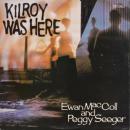

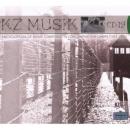



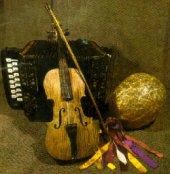
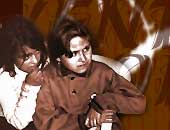
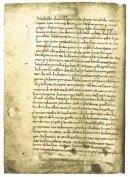
Child #200
Tradizionale scozzese
Scottish Traditional
[Origin: 17th Century]
[Origine: XVII Secolo]
Modern Performers: Ewan McColl, Dick Gaughan, Jean Ritchie (American version)
Interpreti moderni: Ewan McColl, Dick Gaughan, Jean Ritchie (versione americana)
In questo sito cerchiamo il più possibile di andare alle radici delle cose. Con questa ballata seicentesca scozzese, catalogata dal Child con il n° 200, ci spingiamo in epoche dove gli "zingari rapitori" vengono messi alla forca; una cosa, ovviamente, promanante da un pregiudizio del tutto scomparso. In questa felice epoca, secoli dopo, ci limitiamo soltanto a dire che "rapiscono i bambini" con susseguenti pogrom a Ponticelli e altrove. Pregiudizi, come si vede, antichissimi. Anche in questo caso il commento e la traduzione provengono dal mio vecchio sito sulle Ballate Popolari Angloscozzesi; la traduzione risale a circa il 1992. [RV]
Nel 1624 un capotribù gitano chiamato Johnny Faa (un nome assai comune fra gli zingari stanziati nelle isole Britanniche) fu giustiziato da alcuni ufficiali scozzesi per dei motivi rimasti oscuri; in ogni caso, non è mai stata stabilita alcuna relazione tra lo sventurato gitano -e tra nessun altro gitano- e la moglie di un conte di Cassilis, casato storico scozzese del più alto lignaggio. Assai probabilmente, il fatto fu collegato ad un rapimento, proprio come adesso si dice che gli zingari “rapiscano i bambini”; si tratterebbe quindi di una credenza e di un pregiudizio razzista assai antichi. Nella ballata che qui presentiamo (da Scots Magazine, 80:309) il marito riesce a salvare la moglie dai suoi rapitori e fa impiccare Johnny Faa e i suoi complici; questa è la trama usuale delle versioni scozzesi, dove, tra l’altro, all’inizio la giovane (e, si presume, alquanto annoiata) sposa si fa "rapire" ben volentieri (malgrado sia vittima di un incantesimo), salvo poi pentirsi poco dopo, quando si accorge che la vita libera e vagabonda è in realta assai scomoda. Come è lecito attendersi, le versioni americane, pur mantenendo l’intreccio di fondo, differiscono in diversi punti; ad esempio, il lord scozzese diviene un landlord (proprietario terriero, latifondista), l’unico tipo possibile di lord conosciuto dagli americani. La differenza principale è però il finale: in nessuna versione americana, infatti, gli zingari vengono puniti per il loro misfatto, ed anzi, in diverse versioni, la moglie addirittura si prende gioco del marito e si rifiuta di tornare con lui.